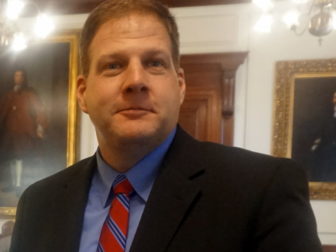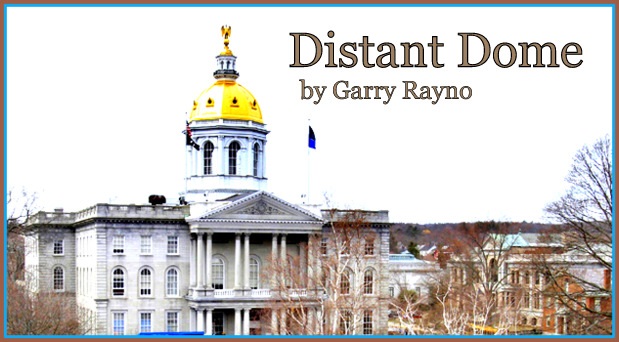InDepthNH.org and Manchester Ink Link co-publish Distant Dome
By GARRY RAYNO, Distant Dome
You could ask how does a state budget go $100 million out of whack in a half-a-dozen months.
Lawmakers will grapple with that question this week in what are expected to be the final sessions of the 2017-18 legislature bar an adverse Supreme Court ruling on voting rights after lawmakers go home at the end of the week.

Garry Rayno
A couple of significant issues were unresolved when lawmakers approved the 2018-2019 biennial budget about a year ago.
One was the lack of a new collective bargaining agreement with state employees and the other a pending legal fight over how hospitals and other medical service providers like community mental health and health-care centers are reimbursed for uncompensated care or the services they provide which they are either not paid for or paid at a rate below what it costs to provide the services.
Both issues are now settled with an agreement on a new two-year contract with state employees and a federal court ruling siding with hospitals on the federal rule changes that reduces what they can claim in uncompensated care.
The new labor contract will add $13 million to the state budget while the agreement with hospitals will add $44 million, but also changes the formula used to determine how much each hospital receives in state aid for treating the poor, uninsured or those who are insured but cannot afford the deductibles or co-pays.
The agreement with the hospitals provides financial stability to both the state and hospitals both sides said in announcing the deal that pays hospital less than they would have received if the federal lower court ruling holds on appeal which could take several years to resolve.
But that is not all that is in House Bill 1817 referred to as the Christmas Tree bill.
In years past Christmas Tree bills — so named because of the “many things” hung on them — were common to cover supplemental spending but not so common after House rules were changed to prohibit the practice, although not all that successfully.
Current rules are not as restrictive and more importantly there is a nearly $100 million revenue surplus — about 90 percent from business taxes — with two months to go in the 2018 fiscal year.
With money available to spend, lawmakers just can’t help themselves.
Red-listed or structurally deficient bridges have been a problem for some time both for the state Department of Transportation and at the local level.
The current highway revenue stream from the gas tax and vehicle registrations is not enough to keep up with the need. Although the gas tax was raised several years ago, the additional revenue is not enough to meet infrastructure needs.
With money to spend, lawmakers added $20 million over the next 14 months to address the deficient bridges that once prompted former DOT commissioner Chuck O’Leary to recommend people “drive fast and don’t look back” when they go over the red-listed bridges, which did not please then-Gov. Steve Merrill.
Over the past two budget cycles, revenues outpaced projections allowing the state to boost its rainy day fund to nearly $100 million. While that is significantly higher than it has been in a couple of decades, it is still short of what bond rating agencies would like to see in the state’s savings account.
So with money to spend, $10 million is allocated to boost state government savings.

Gov. Chris Sununu
Then there is Gov. Chris Sununu’s pet projects, one of which is funded in the supplemental budget bill and one is not.
Sununu and others pushed a recovery workplace initiative that would allow tax credits to businesses willing to work with employees recovering from substance abuse.
The program sailed through the Senate but House budget writers believed it needed much more work to be viable and sent the bill to interim study, a polite death in the second year of the two-year session.
House and Senate negotiators agreed to spend $1 million on the program through the Community Development Finance Authority but without the tax credit piece, creating a one-year pilot program.
Negotiators also agreed to spend $2.5 million on transitional housing — a long-time problem — for people leaving mental health or substance abuse treatment facilities.
The money would go through the New Hampshire Housing Authority.
And the original intent of the bill does survive, hiring a state demographer to study the state’s changing demographics.
This bill had some problems in the House and the vote this week may be closer than the GOP leadership would like, but there are enough “presents” to corral the votes needed to send it to Sununu’s desk.
HB 1817 will address the current fiscal issues until the new legislature begins work on the next biennial budget in eight months.
Voting
The GOP legislature did their party’s governor a very big favor last week although the act did not receive much publicity.
Two bills going through the legislature this session would do essentially the same thing -marry the definition of domicile for voting to residency requirements.
Initially House Bill 372 received most of the publicity and Sununu was captured on video telling a young person he hated the bill and would veto it.
House Bill 1264 is almost identical to HB 372 and like that bill would remove the phrase “for the indefinite future” from the definition of voting domicile, which would require someone like a college student to be a permanent resident in order to cast a ballot.
The House and Senate agreed on the content of HB 1264 and it is on its way to Sununu’s desk although that can take a while as it travels through the enrolled bills process, and garnering the required sign offs on the final version of the bill by the Senate President and House Speaker.
Sununu’s position on the residency requirement has evolved and he now says he would sign the bill if the state Supreme Court issues an opinion saying the voting restrictions are constitutional.
On a party line 3-2 vote last week, the Executive Council sent Sununu’s request to the Supreme Court.
The court set a May 31 deadline for legal briefs.
But HB 372, which Sununu said he would veto, went to a committee of conference of House and Senate negotiators to attempt to work out their differences.
Guess what? They did not. The conference committee met twice and the House leadership changed two conferees but no agreement was reached and the bill died.
So now Sununu has no bill to veto and his campaign spokesman can remind Democrats of that when they run ads on “Governor Flip Flop” with the video with his promised HB 372 veto and reminding voters he failed to do that.
Who says lawmakers cannot think beyond the next election?
Oh wait, that ad will run during the next election.
Garry Rayno may be reached at garry.rayno@yahoo.com
Distant Dome by veteran journalist Garry Rayno explores a broader perspective on the State House and state happenings. Over his three-decade career, Rayno covered the NH State House for the New Hampshire Union Leader and Foster’s Daily Democrat. During his career, his coverage spanned the news spectrum, from local planning, school and select boards, to national issues such as electric industry deregulation and Presidential primaries. Rayno lives with his wife Carolyn in New London.





